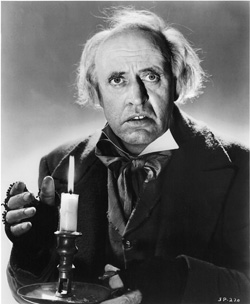
Your complimentary articles
You’ve read all of your complimentary articles for this month. To have complete access to the thousands of philosophy articles on this site, please
If you are a subscriber please sign in to your account.
To buy or renew a subscription please visit Subscriptions.
If you are a print subscriber you can contact us to create an online account.
Articles
The Free Will of Ebenezer Scrooge
Richard Kamber considers the possibility of changing destiny.
The eeriest episode in Charles Dickens’ A Christmas Carol (1843) is the visit to Ebenezer Scrooge of the Ghost of Christmas Yet To Come. The shrouded specter transports the old man to a bedroom where his own corpse lies “plundered and bereft, unwatched, unwept, uncared for,” and then to his grave in a churchyard “overrun by grass and weeds.” When Scrooge begs to “see some tenderness connected with a death” the ghost conducts him to the Cratchit family grieving over the death of Tiny Tim. Profoundly shaken, Scrooge implores: “Assure me that I yet may change these shadows you have shown me, by an altered life!” The ghost remains silent, but we know from the end of Dickens’ tale that Scrooge begins altering his life on Christmas day.
Fate & Freedom

Ebenezer Scrooge (Alistair Sim) has a vision of his (possible) future
This story differs in a philosophically interesting way from fatalistic tales of protagonists who, although warned about calamities to come, are unable to avoid them.
…









